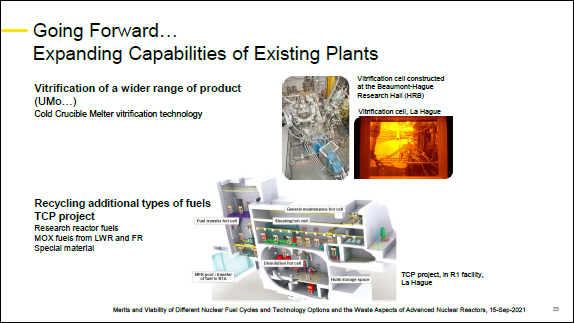HALEU
As one of the only commercial entities integrated throughout the entire fuel cycle, Orano has the technical expertise to efficiently plan for and support all aspects of a HALEU supply chain, including production, storage, transportation and logistics.
Key Points
Orano is collaborating with advanced reactor developers and the DOE to leverage our expertise with all fuel types, including the next generation of nuclear fuel.
Traditionally, the nuclear energy industry has operated with commercial enrichments for its nuclear fuel of 5% uranium-235 LEU (Low Enriched Uranium), with the associated industrial supply chain, legal, and regulatory frameworks designed accordingly.
Current advanced reactor technologies are based on gas-cooled, liquid metal, or molten salt designs, which require LEU+ fuel at 6% or HALEU (High-Assay, Low Enriched Uranium) in the highest enrichment category at 19.75%. HALEU material is familiar and manageable, but not widely used beyond the research reactor market. Using higher enrichment fuel for commercial purposes allows these next-generation reactor technologies to achieve improved efficiencies and longer operating cycles with each reactor core.
Supplying the wide range of advanced reactor concepts with a customized, sustainable, cost-competitive fuel supply will require new dedicated enrichment capacity along with associated chemistry services (“deconversion”) to produce the variety of fuel forms desired by the market. But this significant investment in production expansion first requires confirmed demand by recipient reactor developers or government entities.
"With firm customer commitments, Orano is prepared to supply enrichment greater than 6% by 2030."
Orano Awarded DOE HALEU Enrichment Contract, Oct. 17, 2024 - Orano has been selected by the U.S. Department of Energy to provide enrichment services for producing High-Assay Low-Enriched Uranium (HALEU) from new domestic capacity.Orano Proposal Accepted by DOE for HALEU Deconversion Contract Award, Oct. 10, 2024 - Orano received notification that its proposal was accepted by the Department of Energy in a six-company contract award for the deconversion of high-assay low-enriched uranium (HALEU).
Orano USA Seeks to Locate Uranium Enrichment Operations in Oak Ridge, TN, Sept. 4, 2024 - Orano announced the selection of Oak Ridge, Tennessee, as Orano's Preferred Site to construct a multi-billion-dollar, state-of-the-art centrifuge uranium enrichment facility.
Orano Announces 30% Increase in Uranium Enrichment Capacity by 2028, Oct. 26, 2024 - Orano’s Board of Directors approved a $1.8 billion investment to increase the Georges Besse 2 (GB2) facility’s uranium enrichment capacity by 2.5 million separative work units (SWU) representing more than a 30% increase.
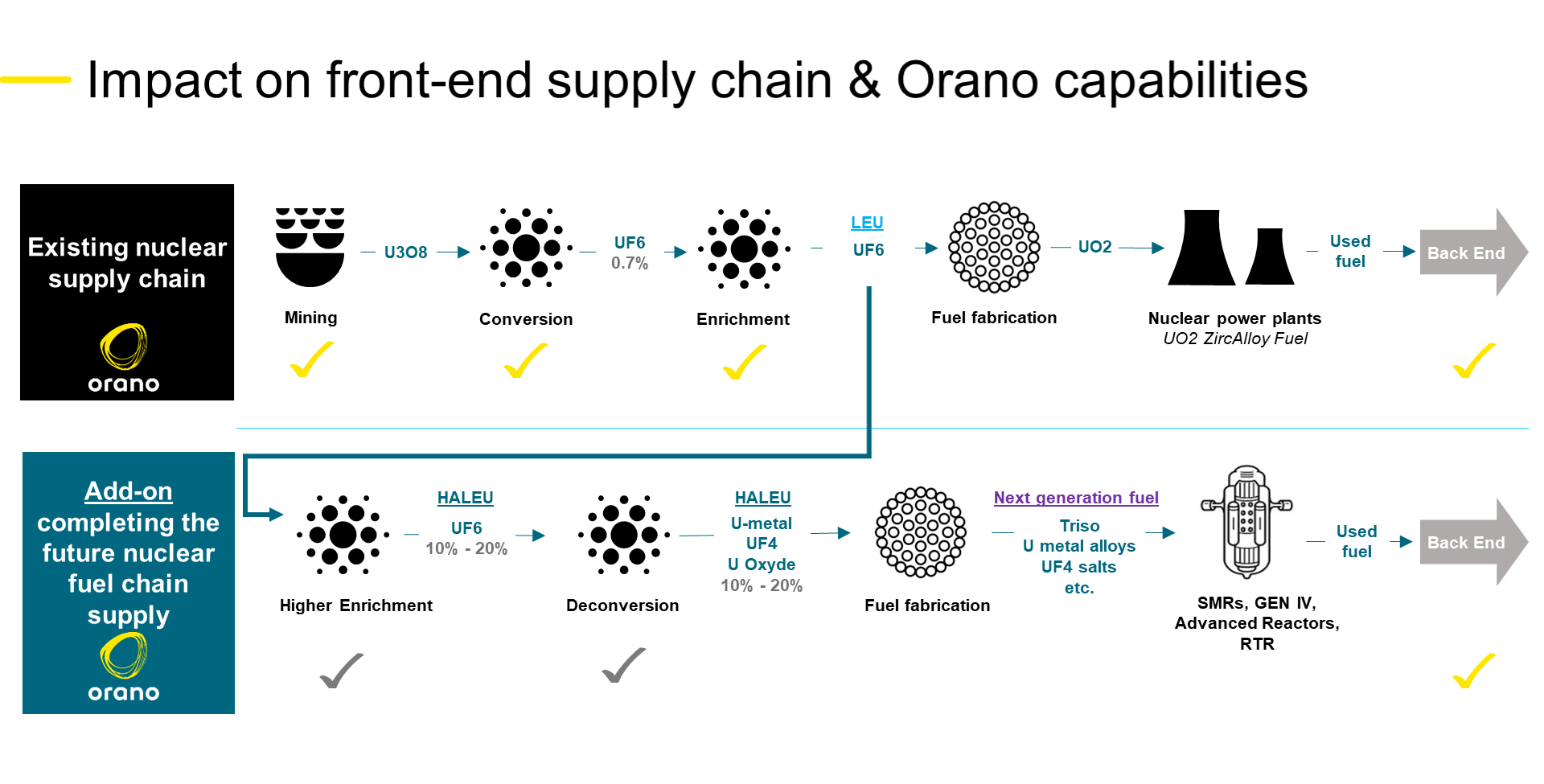
Slide from one of Orano's HALEU presentations to the National Academy of Sciences. See NAS Presentations link above.
#{name}
DOE RFI - HALEU Market
Orano USA submitted a detailed response to the 21 questions in the Department of Energy’s “Request for Information (RFI) Regarding Planning for Establishment of a Program to Support the Availability of High-Assay Low-Enriched Uranium (HALEU) for Civilian Domestic Research, Development, Demonstration, and Commercial Use.”
The content and recommendations are based on the global Orano Group’s six decades of experience operating its uranium conversion and enrichment facilities in France and providing nuclear material transportation packaging and services for international customers.
Orano's Recommendations for Establishing a U.S. HALEU Market
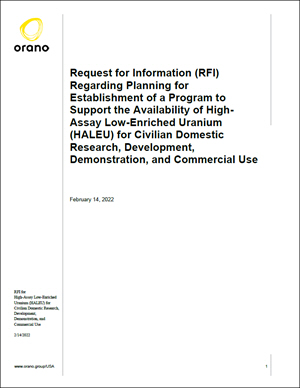 In
summary, a successful DOE approach will ensure that HALEU production is available when needed, provided in the required physical forms, and commercially cost-competitive.
In
summary, a successful DOE approach will ensure that HALEU production is available when needed, provided in the required physical forms, and commercially cost-competitive.
An assessment of the infrastructure requirements to support advanced nuclear energy systems shows evident but bridgeable gaps. The focus of our response to this RFI was to define the steps and conditions necessary to ensure that a U.S.-based platform for commercial HALEU production is available to support advanced reactors.
Enrichment capacity is one foundational element of the required infrastructure, but it would be a mistake to view any element of the advanced nuclear ecosystem in isolation. We provided perspective on considerations for the design of a cost-competitive system driven by commercial solutions.
The role of the DOE in accelerating HALEU availability is essential, given the lack of initial offtake demand from the commercial market. As instructed by the Congress, the DOE should organize the collective power of the U.S. government and industry to deploy commercial capabilities as quickly and cost-effectively as an equitable process will allow.
This will require a cooperative, market-oriented approach that assigns technology and financial risk appropriately. Firm quantity commitments backed by a HALEU Bank or similar mechanism(s) will be important for organizing and accelerating commercial investment in new HALEU production capacity.
Ensuring a sustainable, cost-competitive fuel supply will require new dedicated enrichment facilities along with deconversion facilities to produce the HALEU fuel in the variety of physical forms required by the different advanced reactor designs.
The uncertainty of fuel design and industrial specifications is reflective of larger commercial uncertainties that could prove to be a significant barrier in the financing of new HALEU production capacity, especially from the lack of firm, sufficient offtake or utilization demand.
This creates a challenging dilemma for the industry where
- investors are reluctant to put money into advanced reactor construction without an established fuel supply, and
- fuel suppliers are equally unwilling to license and construct the necessary enrichment and deconversion capabilities until they have received commercial commitments that guarantee a certain volume of demand.
DOE can reduce barriers to commercial HALEU availability through supporting a fast-track design and licensing process for future production facilities. This will accelerate industrial readiness and, when coupled with defined offtake agreements, will support investment in an industrial platform.
In the design of these public-private partnerships, technology risk should be borne primarily by industry in alignment with existing commercial expertise in enrichment, deconversion, packaging, and logistics. On the other hand, economic risk must initially be borne by the DOE to sufficiently reduce the investment risks posed by an uncertain demand environment until a competitive market develops, similar to the existing uranium market for today’s operating nuclear reactors.
There are no technical or licensing challenges to the transport of HALEU. Within the constraints of licensing and manufacturing lead-times, the availability of a transport fleet of packages is largely a function of commercial demand for its use. The manufacture of transport packages is unlikely to proceed at commercial risk, but would be responsive to firm commitments.
With a significant market presence and decades of fulfilled contracts for uranium, conversion, and enrichment services in the United States, Orano is fully committed to serving the needs of its customers and supporting the development of the advanced nuclear energy industry. As one of the only commercial entities integrated throughout the entire fuel cycle, Orano has the technical expertise to efficiently plan for and support all aspects of a HALEU supply chain, including production, storage, transportation and logistics.
Read Orano's submitted HALEU DOE RFI
#{name}
National Academy of Sciences - HALEU Presentations
Orano provided three presentations with perspective and information about standing up a U.S. HALEU supply chain to the Academy of Sciences: Merits and Viability of Different Nuclear Fuel Cycles and Technology Options and the Waste Aspects of Advanced Nuclear Reactors: September 13-15, 2021.
Orano USA, "HALEU Market" ( PDF, 1.9 MB)
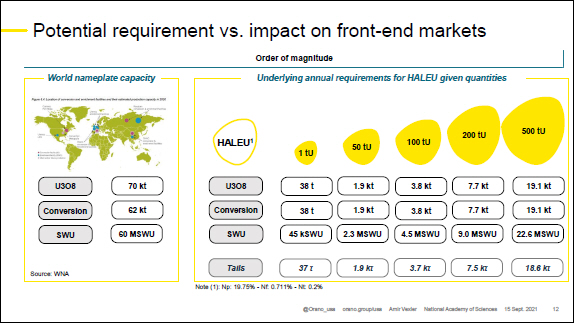
Sven Bader, Orano Federal Services, "Back-End of the Nuclear Fuel Cycle & Used Fuel Management for Advanced Reactor (PDF, 2 MB)
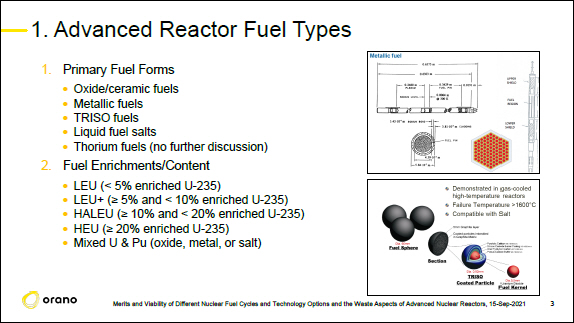
Arnaud Gay, Orano Group, "Back-End of the Nuclear Fuel Cycle & Existing Recycling Solution at ORANO (PDF 2.5 MB)
